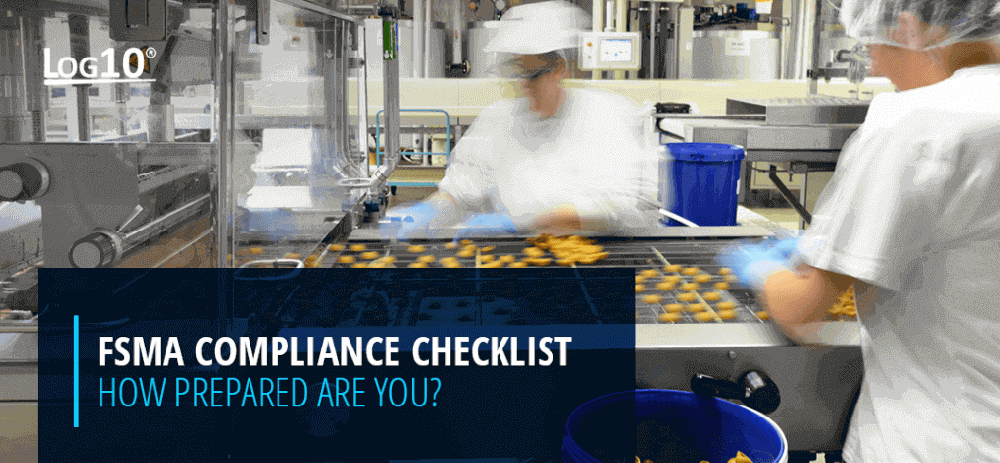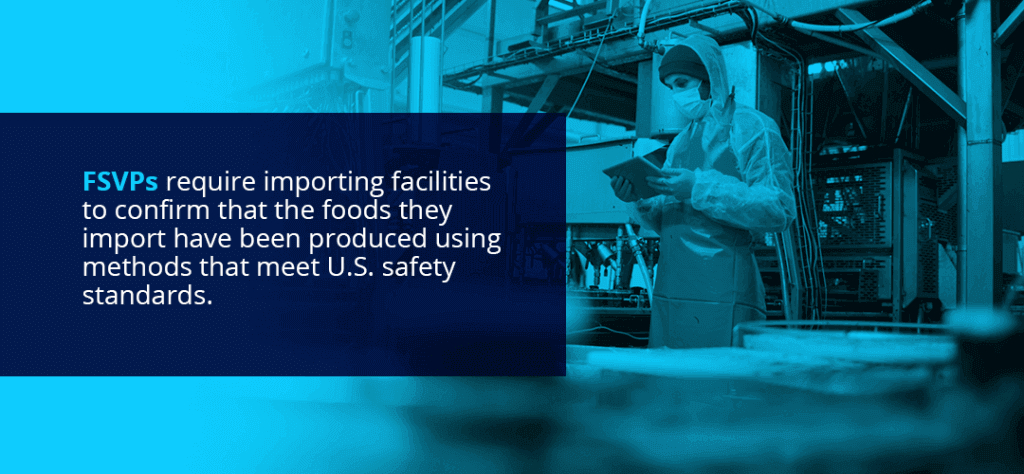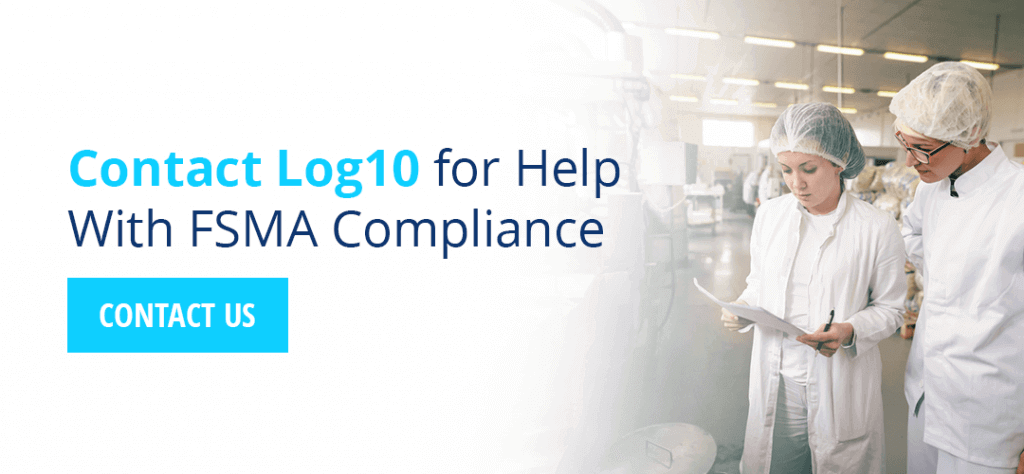
In the United States, because of foodborne illnesses, about 48 million people — one out of six — become ill every year. Of those people, 128,000 become hospitalized, and 3,000 die. But with its Food Safety Modernization Act (FSMA), the U.S. Food and Drug Administration (FDA) has developed a series of rules that facilities must comply with to make food products safer for the public to consume.
What is FSMA compliance, and what FSMA rules and regulations do you need to know? Below, we’ve created a checklist to help you get ready.
In This Article:
- What Is the FSMA?
- The Major Rules of FSMA
- Accredited Third-Party Certification
- Current GMP, Hazard Analysis and Risk-based Preventive Controls for Food Processors
- Current GMP, Hazard Analysis and Risk-based Preventive Controls for Food for Animals
- Foreign Supplier Verification Programs (FSVP)
- Mitigation Strategies to Protect Food Against Intentional Adulteration
- Sanitary Transportation of Human and Animal Food
- Growing, Harvesting, Packing and Holding of Produce for Human Consumption Standards
- Voluntary Qualified Importer Program (VQIP)
- How to Prepare Your Company for Compliance
What Is the FSMA?
The FSMA is a piece of legislation designed to help prevent foodborne illnesses. It is implemented by the FDA and contains rules that specify concrete actions food-processing facilities must follow to remain compliant and help preserve public health by protecting against foodborne illness outbreaks.
The Major Rules of FSMA
Below are the major rules of the FSMA.
Accredited Third-Party Certification
The FDA’s Accredited Third-Party Certification is a voluntary program. Under this program, the FDA recognizes accreditation bodies, which accredit certification bodies, which in turn conduct food safety audits and issue certifications for foreign facilities. This voluntary certification serves two purposes:
- Establishing eligibility for VQIP: VQIP, which we will discuss in greater detail below, offers expedited review and entry of imported food. Third-party certification helps determine eligibility.
- Allowing FDA-required certification: In rare instances, the FDA may require that any imported food is certified to prevent potentially contaminated food from entering the United States.
Current Good Manufacturing Practice and Hazard Analysis and Risk-Based Preventive Controls for Human Food
This rule requires facilities to comply with the requirements of risk-based preventive controls to prevent the contamination of food intended for human consumption. Some of the actions facilities will need to take to comply with this rule include the following:
- Developing a food safety plan: Food-processing facilities should develop a safety plan to prevent contamination of their products. The food safety plan should include an analysis of hazards and risk-based FSMA preventive controls that can reduce or prevent those hazards.
- Managing preventive controls: Facilities should also monitor and document their preventive procedures and take corrective actions to address problems. They should perform verification activities such as reviewing their monitoring logs and confirming that preventive measures undertaken are scientifically correct.
- Participating in a supply chain program and recall plan: Manufacturers that must control for hazards in their supply chain program must take steps such as receiving materials and ingredients only from approved suppliers. They must review documentation that verifies the supplier’s control of the hazard, if necessary. They should also have a written recall plan that documents the procedures for recalling a product.
Current Good Manufacturing Practice and Hazard Analysis and Risk-Based Preventive Controls for Food for Animals
This rule requires facilities to comply with the requirements of risk-based preventive controls to prevent the contamination of food intended for animal consumption. Farms and feed mills that are part of farms are not obligated under this rule. Some of the actions facilities will need to take to comply with this rule include the following:
- Developing a food safety plan: As with facilities that produce food for human consumption, facilities that produce food for animal consumption should develop a safety plan to prevent contamination of their products. The food safety plan should include an analysis of hazards and a written plan for preventive controls, which should encompass process controls, sanitation controls and any other necessary controls.
- Managing preventive controls: Facilities should also monitor and document their preventive procedures, take corrective actions to address problems and perform verification activities such as reviewing their monitoring logs and confirming that preventive measures undertaken are scientifically correct.
- Participating in a supply chain program and recall plan: Manufacturers that must control for hazards in their supply chain program must take steps such as receiving materials and ingredients only from approved suppliers and reviewing documentation that verifies the supplier’s control of the hazard, if necessary. They should also have a written recall plan that documents the procedures for recalling a product.
Foreign Supplier Verification Programs (FSVP)

FSVPs require importing facilities to confirm that the foods they import have been produced using methods that meet U.S. safety standards. Some of the actions facilities will need to take to comply with this rule include the following:
- Performing hazard analysis: Importing facilities must identify potential biological, chemical and physical hazards and assess the probability that the hazards will occur in the facility in the absence of preventive controls.
- Evaluating food risk and supplier performance: Importing facilities must also evaluate the foreign supplier’s own raw material or ingredient supplier, the foreign supplier’s procedures and practices related to food safety, the foreign supplier’s compliance with FDA food safety regulations, the foreign supplier’s food safety history and responsiveness to correcting past problems, and other factors, including the foreign supplier’s storage and transportation procedures.
- Taking corrective actions: Importing facilities must also be quick to take corrective action if a foreign supplier does not provide the required level of public health protection for the food products it supplies.
Mitigation Strategies to Protect Food Against Intentional Adulteration
This rule is designed to prevent intentional contamination from acts such as terrorism that would attempt to cause widespread harm. Some of the actions facilities will need to take to comply with this rule include the following:
- Assessing vulnerability: Facilities must make a vulnerability assessment that provides information about potential vulnerabilities, actionable process steps, the degree to which intentional adulteration would affect public health, the degree of physical accessibility of the product and the potential ability to contaminate the product.
- Developing mitigation strategies: Facilities should develop mitigation strategies to provide assurance that the facility can minimize or prevent vulnerabilities. These mitigation strategies should include the components of food defense monitoring, corrective actions and verification.
- Providing training and recordkeeping: Facilities should also give appropriate training to staff members assigned to vulnerable areas, and they should keep records of their food defense monitoring, corrective actions and verifications.
Sanitary Transportation of Human and Animal Food
This rule is intended to ensure that transportation practices keep food safe and free from contamination. It creates requirements for the following:
- Vehicles and other transportation equipment: Facilities must ensure that transportation equipment is suitable and adequately cleaned so that it keeps food safe. Transportation equipment must also be kept at the proper temperature.
- Transportation operations: Facilities must ensure proper transportation operations as well. Transportation operations include processes such as controlling the temperature correctly, preventing contamination of ready-to-eat food by raw food, nonfood items or food allergens.
- Training: Facilities must train carrier personnel to comply with transportation safety procedures if the personnel are responsible for maintaining sanitary conditions for transportation. The facility must also document the training.
Standards for the Growing, Harvesting, Packing and Holding of Produce for Human Consumption
This rule establishes minimum standards for growing, harvesting, packing and holding fruits and vegetables. Some of the actions facilities will need to take to comply with this rule include the following:
- Test water quality: The water used for growing fruits and vegetables should be free from E. coli. Farm water should undergo quality testing if it does not come from a public water supply. For surface water, facilities should take 20 samples initially and five samples annually thereafter. For groundwater, facilities should take four samples initially and one sample annually thereafter. More samples will be necessary if tests show the presence of E. coli.
- Handle biological soil amendments properly: Biological soil amendments, such as manure, must be applied in such a way that they do not come into contact with produce during or after application. Compost must also contain limited amounts of the bacteria Listeria monocytogenes, Salmonella spp., fecal coliforms and E. coli.
- Enforcing correct worker hygiene: Workers who handle produce must receive training on the importance of health and hygiene. Facilities must take steps to prevent the contamination of produce by ill workers and must make toilet and hand-washing stations available to workers.
Voluntary Qualified Importer Program (VQIP)
VQIP is an optional, fee-based program that speeds up review processes and import entry for human and animal foods entering the United States from abroad. The program has a number of eligibility requirements:
- A three-year history of importing food into the United States.
- A Data Universal Numbering System (DUNS) number.
- Use of paperless filers or brokers who received an “acceptable” rating during their last FDA filer evaluation.
- Importing no foods that are subject to an import alert or a Class 1 recall.
- Not being the subject of an ongoing FDA judicial or administrative action.
- Not having significant food safety noncompliance in the past.
- Remaining in compliance with the supplier verification and other importer responsibilities under the applicable seafood HACCP, juice HACCP and FSVP regulations.
- Having a current facility certification for each foreign supplier of the food intended for import.
- Developing and implementing a VQIP Quality Assurance Program.
- Not having been the subject of U.S. Customs and Border Protection penalties, forfeitures or sanctions related to food safety within the past three years.
- Paying the user fee before October 1.
How to Prepare Your Company for Compliance
You can prepare your company for compliance by taking some of the following steps:
- Train personnel: Establish specific roles for each of your staff members and provide them with adequate training in ensuring sanitary conditions in your facility.
- Perform hazard analysis: Assess your facility to identify and evaluate any potential hazards. Assess potential contamination points such as labeling, storage, processing surfaces, utensils, personnel handling and transportation.
- Evaluate your facility and supply chain: Check that both contact and noncontact surfaces are kept free from bacteria, and label hazardous materials appropriately. Be sure to perform routine audits of suppliers who supply potentially hazardous materials, and have measures in place to alert you to and prevent acts of intentional contamination.
- Work with a consulting service: A consulting service like Log10 can help your facility with monitoring, testing, developing standard operating procedures (SOPs) and more.
Contact Log10 for Help With FSMA Compliance
When you need to develop a food safety preventive control plan for Food Safety Modernization Act compliance, Log10 can help. We provide expert, professional consulting, research, testing and training support to help facilities manufacture and deliver safe, quality food products to meet FSMA regulations and compliance. Contact us today to learn more.

